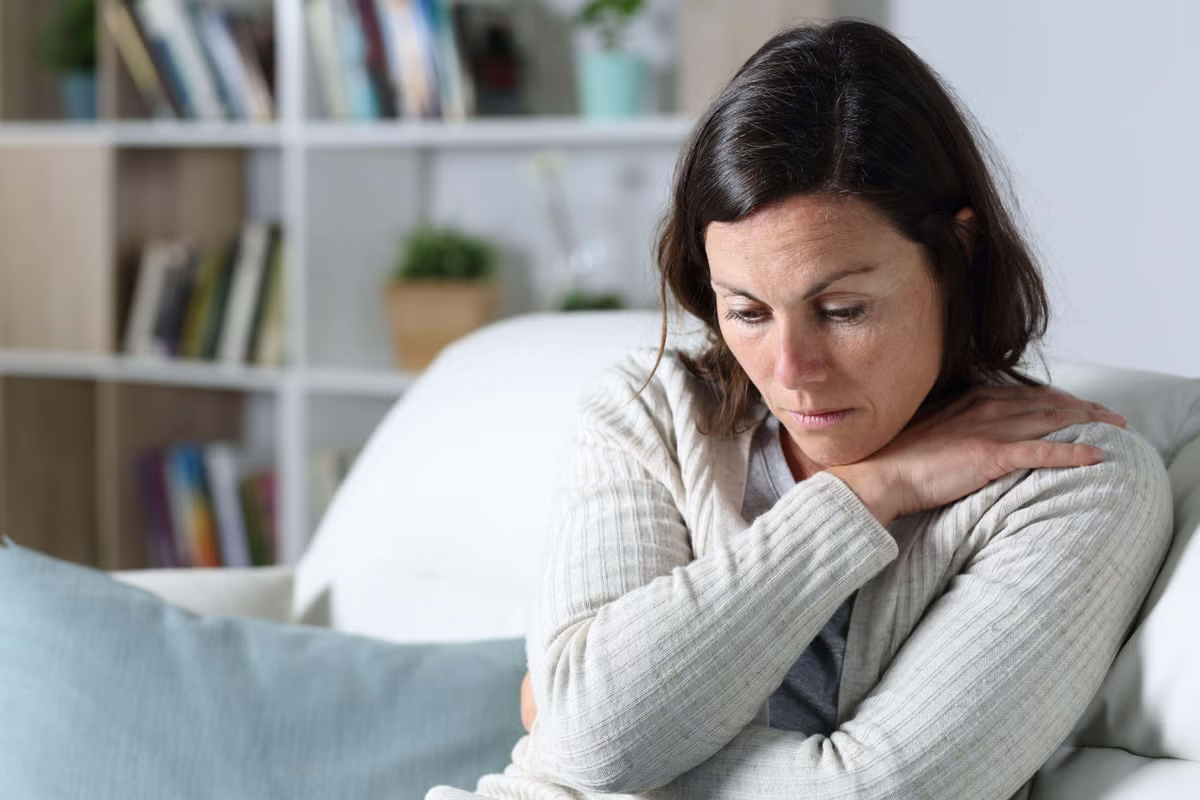
Your support helps us to tell the story
Our mission is to deliver unbiased, fact-based reporting that holds power to account and exposes the truth.
Whether $5 or $50, every contribution counts.
Support us to deliver journalism without an agenda.

Louise Thomas
Editor
Menopause is usually associated with hot flushes and mood swings, however women often experience a plethora of other symptoms which aren’t necessarily spoken about as much.
Perimenopause is the period when women start experiencing menopausal symptoms; menopause is when periods stop due to lower hormone levels. These are some of the other symptoms that you might not realise are associated with perimenopause and menopause..
Joint pain
“This is very common in women experiencing the menopause, and around 60% of women will experience this,” says Dr Shahzadi Harper, GP and women’s health advocate working with UTRescue. “It can start in perimenopause and is due to a decline in estrogen.
“Oestrogen receptors are all over our bodies, in our skin, joints, brain, and so the drop in oestrogen causes a drop in levels of our synovial fluid causing our joints to ache.
“Oestrogen decline can also affect our bone density in the long run, increasing risk of osteoporosis.”
If joint pains are impacting your daily activities, it’s worth speaking to your GP.
“There are lots of other things that can cause joint pain so it’s important to sort of exclude those other things too,” says Dr Susanna Unsworth, menopause specialist and in-house women’s health expert for INTIMINA. “If it doesn’t respond to menopause treatments like HRT, then other potential causes need to be looked into.”
Difficulty sleeping and insomnia
Lots of women suffer from restless sleep when they go through menopause.
“This is very common due to a decline in oestrogen and progesterone hormones, which mean women often experience broken sleep and less restorative sleep,” explains Harper. “The drop in these hormones often causes a drop in NREM 3 cycle of our sleep, which means many women will wake up feeling less refreshed, causing brain fog and a lack of mental focus.”
She says this can then potentially “impact our appetite” and “cause flatness in our moods”.
Itchy skin/dry skin
“Itchy skin can be due to a decrease in collagen and oil production which can cause dryness and itching,” notes Dr Shirin Lakhani, women’s health and menopause expert. “As oestrogen levels drop during menopause, so do our collagen levels, which are essential in skin health.
“This is medically known as pruritus, which is actually reported to be the primary skin concern for women over 65.
“The drop in oestrogen levels can also lead to dryness and this can also cause the skin to become itchy.”
Other symptoms, such as night sweats, may also cause the skin to itch.
“There are simple things you can do, such as moisturising as you would do with any sort of dry skin issue,” suggests Unsworth. “But, if that’s not responding to treatment, it warrants speaking to a GP.
“If there’s any sort of unusual rashes then they need to be checked out to make sure there isn’t another cause. ”
Dry eyes
“Decreasing oestrogen levels can affect the corneas of our eyes, and can result in temporary blurred vision,” highlights Lakhani. “The androgen hormone decreases after menopause, which can affect the amount of tears we produce. This sometimes make the eyes feel dry, itchy or gritty.”
Using eye drops can help sort this. “It’s worth going to speak to an optician who can direct to certain eye drops which can help,” advises Unsworth. “If it doesn’t get better then this needs more attention. It might potentially improve with hormone therapy.”
UTIs
“As oestrogen production falls during the perimenopause and menopause, UTIs can happen more frequently,” explains Lakhani. “In postmenopausal women, UTIs often accompany the symptoms and signs of the genitourinary syndrome of menopause.
“As the vaginal tissue thins, it becomes more prone to infection and some women also have more difficulty fully emptying their bladder, which also leads to infection.”
Unsworth adds: “I often see women talking about thrush-like symptoms, but often it’s not thrush. If things haven’t responded to one treatment for thrush, that’s a reason to go and speak to your GP to get this checked out.
“Often we can manage these symptoms really effectively with some sort of vagina oestrogens [a type of HRT medicine], but it does warrant having an examination to make sure there aren’t any other causes.”
Frequent urination
“As we age, we get a reduction in muscle mass which means that the pelvic floor weakens over time, and this can be accelerated by the loss of oestrogen during perimenopause and menopause,” says Lakhani. “These muscles support the pelvic organs which means that a weakening of them can result in pelvic floor problems such as prolapse and incontinence (urinary and faecal).
“Reduced pelvic floor muscle function around the time of menopause can also be due to weight gain, which is common, and often due to hormonal changes.
“Menopause in itself doesn’t cause pelvic floor disorder, but can certainly make symptoms worse.”







